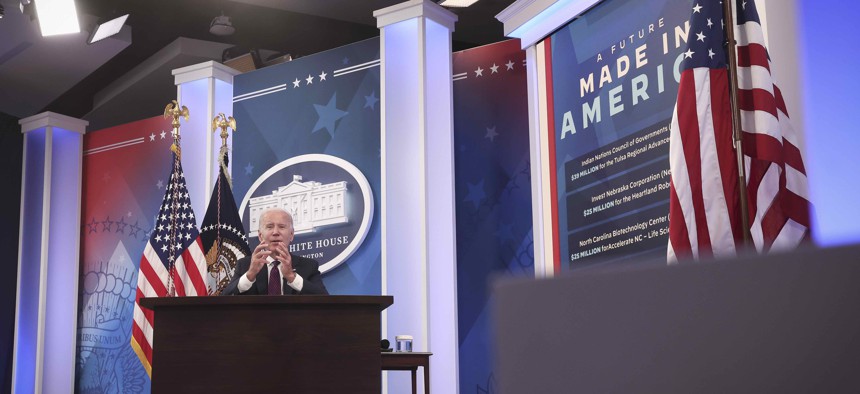Winners Announced for $1B in Regional Development Grants

President Joe Biden delivers remarks during an event September 2, 2022 in Washington, DC. Biden spoke on the “American Rescue Plan” and investments in the legislation targeting regional economic strategies. Win McNamee/Getty Images
The Biden administration named 21 projects across the U.S. that will share in the new funding.
Twenty one regional coalitions will receive a funding boost from the federal government as they try to build more equitable economies based on emerging industries.
The winners of the $1 billion Build Back Better Regional Challenge, overseen by the U.S. Department of Commerce’s Economic Development Administration, were announced on Friday. They will receive grants ranging from $25 million to $65 million. More than 529 groups initially applied for the competitive program. The winners were selected from among 60 finalists.
Each of the selected projects advance the competition’s goals: rebuilding regional economies, creating jobs in industries such as biotechnology and renewable energy and providing opportunities in communities facing persistent poverty.
“Together these projects are going to uplift underserved communities and include them as key parts of America’s economic recovery for the 21st century,’’ President Biden said at a briefing after the winners were revealed. “People who have been left behind in the past…they’re going to be part of this recovery. They’re going to be the ones leading the way, they’re going to be the ones being retrained for these jobs.”
The winners include a biotech partnership in Virginia, a mariculture center in Alaska and a workforce training and loan program to boost Native entrepreneurs in the northern Plains.
In Detroit, a regional partnership will receive $52.2 million to ease the transition of the city’s legacy automotive industry to new mobility solutions built on electrification and other new technologies.
“We’re honored that the [Economic Development Administration] has recognized that the Detroit region is leading the transformation from the internal combustion engine to electric vehicle,’’ said Maureen Krauss, CEO of the Detroit Regional Partnership. The effort in Detroit is led by the Global Epicenter of Mobility, or GEM.
The Build Back Better Regional Challenge is part of Biden’s larger Covid-19 relief plan. The administration is focused on “ensuring that economic opportunity is delivered to all Americans, especially communities that have grappled with decades of disinvestment or suffered economic distress exacerbated by the coronavirus pandemic,” said U.S. Secretary of Commerce Gina Raimondo.
The competitive program represents a novel approach for the department. “This is the first time ever the Commerce Department has made such sizable investments in individual communities,’’ Raimondo said at the White House briefing.
“We weren’t sure if communities would apply," she added.
The size of the grants is also notable, Raimondo said. “Everyone…will be receiving between $25 million and $65 million to address regional economic challenges and to invest in revitalizing the economies of these communities. That’s a lot of cheese, folks."
The winning projects were put together by regional coalitions made up of cities, universities, business and labor organizations, tribal governments, local foundations and nonprofits and other groups.
Raimondo said the initiative will cumulatively create or save more than 100,000 jobs.
“This is about growing industries that are critical to our future—clean energy, biotechnology, advanced mobility,’’ she said. “And it’s about saying to the small businesses and workers in these communities, ‘we know the economy is transitioning, we’re moving away from fossil fuels to clean energy, we’re moving toward robotics, we’re moving toward a more digital economy.'”
The effort aims to ensure that “no one will be left behind, because we’re going to retrain workers, we’re going to retrain small businesses and we’re going to light up abandoned buildings that may have once trained coal miners and today will train solar installers,’’ she added.
The Build Back Better Regional Challenge winners are:
Central Valley Community Foundation (California)
$65.1 million for the F3 - Fresno-Merced Future of Food
City of Manchester (New Hampshire)
$44 million for The BioFabrication Cluster
Coalfield Development (West Virginia)
$62.8 million for the Appalachian Climate Technologies (ACT Now) Initiative
Detroit Regional Partnership Foundation (Michigan)
$52.2 million for the Global Epicenter of Mobility
Empire State Development (New York)
$25 million for the Western New York's Advanced Manufacturing Cluster
Four Bands Community Fund (South Dakota)
$45 million for the Mountain | Plains Regional Native CDFI Coalition
Georgia Tech Research Corporations (Georgia)
$65 million for GA-AIM
Greater New Orleans Development Foundation (Louisiana)
$50 million for H2theFuture
Greater St. Louis, Inc. (Missouri)
$25 million for the St. Louis Tech Triangle
Indian Nations Council of Governments (Oklahoma)
$39 million for the Tulsa Regional Advanced Mobility Cluster
Invest Nebraska Corporation (Nebraska)
$25 million for the Heartland Robotics Cluster
North Carolina Biotechnology Center (North Carolina)
$25 million for Accelerate NC - Life Sciences Manufacturing
Oklahoma City Economic Development Foundation (Oklahoma)
$35 million for the Oklahoma Biotech Innovation Cluster Initiative
Osceola County Board of County Commissioners (Florida)
$50.8 million for the Building Central Florida’s Semiconductor Cluster for Broad-Based Prosperity
Port of Portland (Oregon)
$41.4 million for the Oregon Mass Timber Coalition
Southeast Conference (Alaska)
$49 million for the Alaska Mariculture Cluster
Southwestern Pennsylvania New Economy Collaborative (Pennsylvania)
$62.7 million for the Southwestern Pennsylvania New Economy Collaborative
The State University of New York (SUNY) at Binghamton (New York)
$63.7 million for New Energy New York
The University of Texas at El Paso (Texas)
$40 million for the West Texas A&D Cluster
Virginia Biotechnology Research Partnership Authority (Virginia)
$52.9 million for the VA BIO Advanced Pharma Manufacturing (APM) and R&D
Wichita State University (Kansas)
$51.4 million for the South Kansas Coalition





